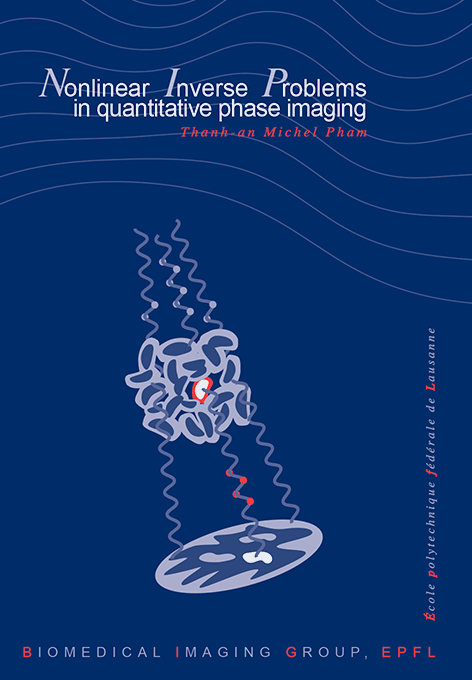Nonlinear Inverse Problems in Quantitative Phase Imaging
T.-a.M. Pham
École polytechnique fédérale de Lausanne, EPFL Thesis no. 8941 (2022), 260 p., June 17, 2022.
The topic of this thesis is the development of new algorithmic reconstruction methods for quantitative phase imaging (QPI). In the past decade, advanced QPI has emerged as a valuable tool to study label-free biological samples and uncover their 3D structural information. This unique tool takes advantage of the scattering of light that results from the complex interplay between the incident electromagnetic wave and the specimen of interest. Yet, the reconstruction process presents numerous challenges in part due to the nonlinear nature of light scattering.
In this thesis, we investigate an accurate nonlinear wave-propagation model that relies on the Lippmann-Schwinger (LiSc) equation and apply it to 3D QPI within a variational framework. Our first contribution is a proper discretization of LiSc and a computationally efficient implementation of the nonlinear model.
Using our novel forward model, we formulate an inverse-scattering problem within a modern variational framework and solve it to recover the 3D refractive-index (RI) map of a sample when the measurements are complex-valued. In such a setting, the sample is probed with a series of tilted incident waves, while the complex-valued waves are recorded for each illumination. Our algorithmic reconstruction involves a nontrivial proximal gradient-based iterative scheme that requires the Jacobian matrix of the nonlinear operator, for which we are able to derive an explicit expression. By accounting for multiple scattering and adding suitable prior knowledge, our results show that we significantly improve the quality of reconstruction over the state of the art.
We then adapt our LiSc model to intensity-only measurements, which has the advantage of simplifying the acquisition setup. We solve this harder inverse problem by leveraging recent advances in proximal algorithms. Our method obtains RI maps with a quality similar to that obtained from complex measurements.
Finally, we propose an extension of single-molecule localization microscopy. This modality delivers nanoscale resolution by sequentially activating a subset of fluorescent labels and by extracting their superresolved position. The emission patterns of each label can be distorted by the sample, which reduces the localization accuracy if not accounted for. Here, we exploit those sample-induced aberrations to recover the RI map. We propose an optimization framework in which we reconstruct the RI map using LiSc and optimize the label positions in a joint fashion. Our results show that we effectively recover the RI map of the sample and further improve the localization.

@PHDTHESIS(http://bigwww.epfl.ch/publications/pham2201.html,
AUTHOR="Pham, T.-a.M.",
TITLE="Nonlinear Inverse Problems in Quantitative Phase Imaging",
SCHOOL="{\'{E}}cole polytechnique f{\'{e}}d{\'{e}}rale de {L}ausanne
({EPFL})",
YEAR="2022",
type="{EPFL} Thesis no.\ 8941 (2022), 260 p.",
address="",
month="June 17,",
note="")